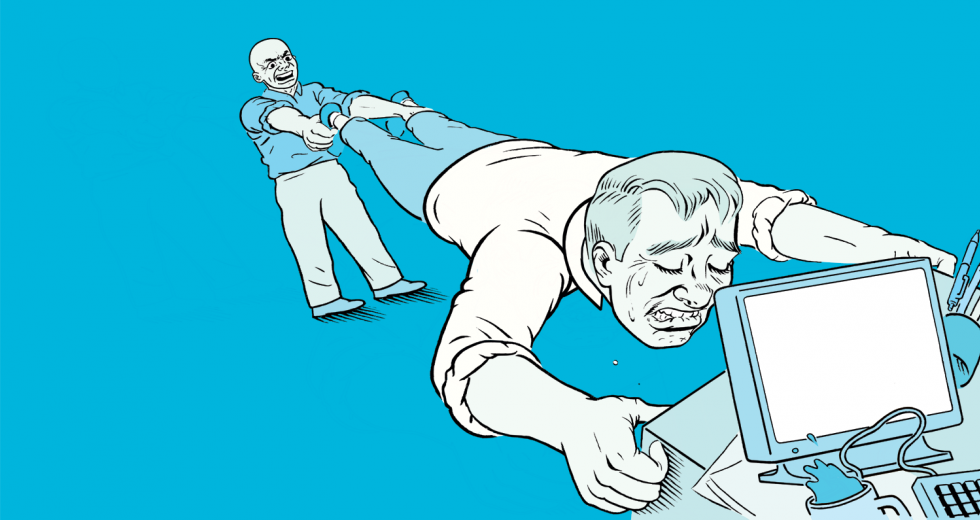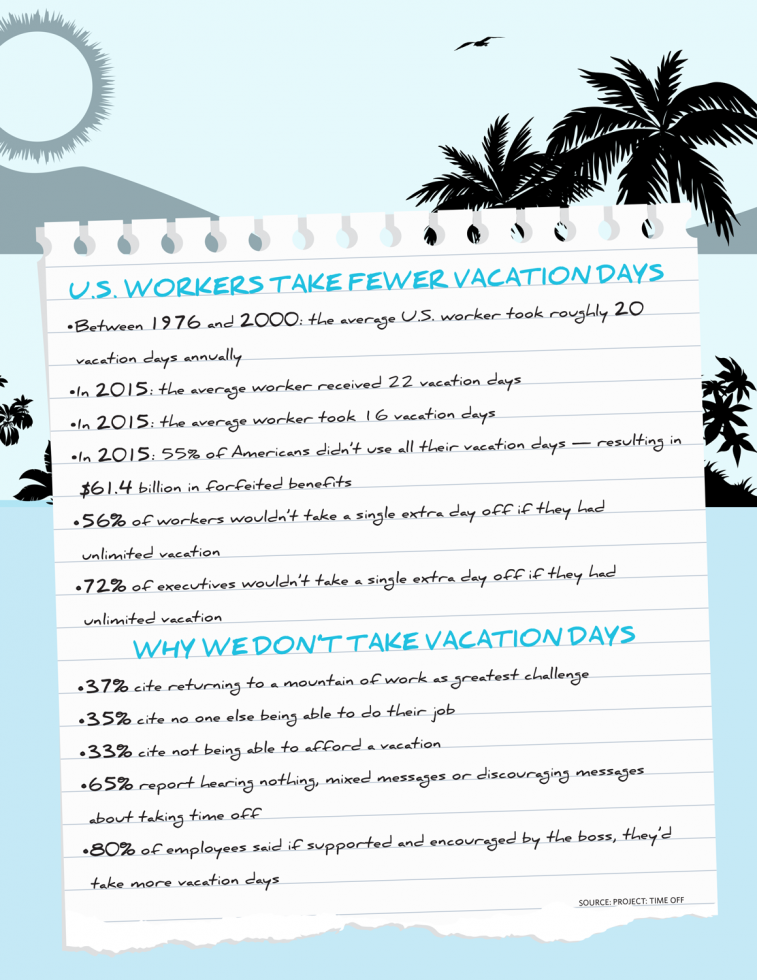You probably need a vacation. Most of America does. Between 1976 and 2000, the average worker took roughly 20 vacation days annually, according to data from Project: Time Off. But as the economy buckled in 2008, so did our desire to flock to the beach, and in 2015, the number plunged nearly a full week lower, translating to 658 million unused vacation days. Much of this is by choice: That same year, 55 percent of Americans left vacation days on the table, preferring to stay in the office than do, quite literally, anything else in the world.
Why are we shackled to our laptops? This vacation gap has roots in the Great Recession, it has a steep (and hidden) cost to employees — and it’s something that, if not addressed, can sap a company of its potential for growth. Luckily, there’s a fix.
How We Got Here
Your vacation means more work for your colleagues — someone needs to cover for you while you spend a week hiking in Costa Rica. But that crucial layer of backup is sliced thinner than it was a decade ago. “During the Great Recession, all businesses had to get lean and cut the fat,” says Chris Glassman, an HR specialist at Leadership One, a Sacramento-based consulting group that focuses on leadership development, performance management and family businesses. “So if someone has three weeks of vacation, they might not take it if they have no backup.”
Many employees, with or without a backup, fear the crushing amount of work that will greet them when they return so that even the idea of a vacation is stressful, according to Gina Dokko, an associate professor at the UC Davis Graduate School of Management. How can you relax if you know that for every hour you nap by the pool, you’ll later spend an extra hour in Excel?
And this fear is for the lucky workers who have job security. Many others are even more skittish of being deemed expendable if gone from their cubes for too long. “The idea of facetime still gets mixed up with a good worth ethic,” Dokko says. “We want to be seen as a good worker, so we feel we need to be in the office.”
Related: Vacation Like a Freelance Boss
A compounding factor: The world moves at a different cadence than it did 20, 10 or even five years ago. “There’s an increasing expectation for responsiveness,” suggests Jannene Litchfield, chief HR officer at Litchfield Human Resources Management, based in Sacramento. “If you text someone, they expect a response in a minute or less. If you email, the expectation is the end of the day. So employees are apprehensive to take time off because they might miss something.”
Making matters worse, the grim numbers might actually understate the vacation gap. Not only are we taking fewer days off, but the actual quality of vacation time has suffered. It’s tough to truly get away. Emails from clients, meeting invites and questions from your boss are lurking inside that tiny slab of smartphone — literally never out of reach. One study found that for those on vacation, roughly 80 percent stayed connected with smartphones. “Staying in touch is becoming more expected,” Litchfield says. “Managers will say, ‘I know you’re on vacation, but I have just a quick question…’”
The Hidden Costs
On the most basic level, a vacation package is part of employee compensation. If employees don’t take it, that’s a form of lost wages. Or, as Dokko puts it, “It’s a form of wage theft. And responsible companies don’t want to do that.” Project: Time Off estimates that the lost vacation days translate into a combined $61.4 billion in forfeited benefits. (PTO is a vacation-advocacy group that conducts research on behalf of travel companies who, to be fair, are not exactly unbiased observers.)
But the real toll is harder to calculate, because it’s more difficult to get hard numbers on the cost of employee burnout. There’s an old fable about a lumberjack hurrying to chop a large stack of wood. He doesn’t want to waste time sharpening his saw, so the saw gets dull and the task takes him even longer. “Vacations reduce stress. They improve human relations. They improve performance. They reduce illness,” Glassman says. “And they improve relationships away from the office; that’s the big one. When things are going well at home, you’re a better contributor at work.
Ernst & Young once conducted an internal study, finding a clear correlation between vacation time and job performance: For every additional 10 hours of vacation time, year-end performance evaluations spiked by 8 percent, presumably because the employees are recharged, fresher and more engaged. Taking more vacation could even give you a higher salary. “Employees who take 10 or less days of vacation time are less likely to have received a raise or bonus in the last three years than those who took 11 days or more,” according to PTO.
Now let’s step back and pretend we’re the CEO. Even if we don’t care about the plight of the worker bee, and even if we are just laser-focused on growing profit, we still might benefit from encouraging more time-off. The reason? Innovation. “You can’t really see the big picture when you’re fighting fires all day long,” Dokko says. “And you can’t really have good solutions unless you can see the big picture. Rumination, reflection and creativity all happen in our off-hours. When you’re away from the office for a significant amount of time, it lets your mind wander.”
Companies not actively encouraging employee vacations are missing a major opportunity to capitalize on their staff’s important ideas. We’re no longer an economy that’s built on farms or factories; employees are the assets. They need to be protected. “Industries are depending on their people, and we’re depending on their minds being active and engaged,” Glassman says. “We need them healthy in mind, body and soul.”
The Fix
To help nudge employees to actually use their vacation days, some companies implement a “use-it-or-lose-it” policy. However, according to Glassman, for many companies, the strategy flops. “Since employees thought it would be more stressful to get away, they said, ‘I’d rather just lose it,’” he says.
Other companies, such as Workday, the financial management firm, are testing the idea of unlimited vacation days, where employees can disconnect as often as they want — as long as the work gets done. This sounds great in theory, but it’s not enough to combat the other factors at play, because deadlines still need to be met. The staffing agency The Creative Group conducted a survey and found that 56 percent of workers — and a whopping 72 percent of executives — would not take a single extra day off even if they had unlimited vacation.
According to the HR experts, true change will come not from tweaking the official company policy but a real shift in the culture — and that starts at the top. “CEOs and senior management have a responsibility to send a message down the line and stick with it,” Dokko says. It’s only human nature: We tend to be influenced by the cues from our bosses, not from the fine print on page 37 of our HR packet. PTO found that 80 percent of employees said that if they felt “fully supported and encouraged by their boss,” they would take more vacation days.
“A lot of this is behavioral,” Litchfield says. “You need to ingrain and reinforce it in the culture. The manager should tell the employee, ‘If you’re on vacation, do not email me.’ Leave them off email distribution lists. And if they are working when on vacation, have a talk with them when they get back, and say, ‘I really didn’t want that. I wanted you to recharge.’”
In the same way that companies are now using big data to collect productivity metrics on their workers, they could do the same with vacation times. “Companies are doing all this stuff with analytics,” says Dokko, who suggests crunching the numbers to find out who’s skimping on vacation, then approaching them with a clear message: “You’re cheating my company out of an opportunity for great ideas.”
Related: You Look Like You Need a Vacation
Even the short-term cost of an employee being gone for two weeks can actually be a benefit. Smart companies use this as a chance for new perspective. “It brings fresh eyes to a role and its responsibilities. Lean processes and structural enhancements can be developed by having fresh eyes on others’ roles and responsibilities,” says Cynthia Broughton, principal consultant at HR Business Partners, also located in Sacramento. “It keeps the department agile and able to adjust if someone has to go out on an extended leave.” Broughton adds that this can even help the development of junior employees as “it can really help those who are upwardly mobile, to fill in for someone at a higher level.”
The onus is not just on the company. Dokko says workers also need to get better at advocating for themselves. “Employees need an attitude adjustment. They are entitled to their vacation,” she says. And there’s one very simple, concrete thing that all of us can do to take more vacation: Plan it.
Project: Time Off found that when employees plan their vacations in advance, they are far more likely to actually take them: 51 percent of people surveyed who planned ahead used all of their vacation time, while only 39 percent of non-planners did. It makes sense: When you have that summer trip to Iceland already on the books, you’ll somehow find ways to make it happen. As scary as that can seem in the short-term, this has a long-term benefit for you, your relationships, your company and the economy as a whole.
So put down this article and go plan a vacation.
Recommended For You

Business Vacay
The millennial approach to business travel
According to a recent article, millennials are not frugal when it comes to company cash. Recent research shows that millennials spend more money on business trips than either gen X or baby boomers — on costly expenses ranging from flight upgrades to hotel room service.

3 Tips for Taking a Vacation
You’ll have to plan ahead to truly unplug
We often get so caught up in the planning of our time away that we fail to consider what needs to happen at the office while we’re gone. Make it as easy as possible for your team to cover essentials while you’re gone, and set yourself up for success upon your return






Comments
Great article and relevant to our company.